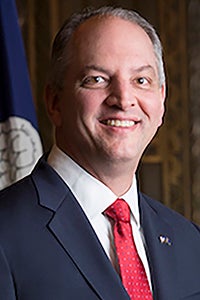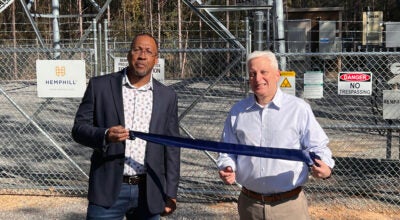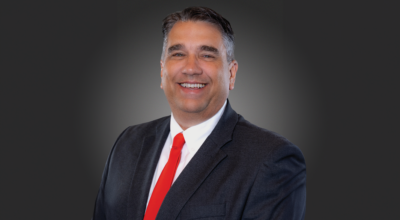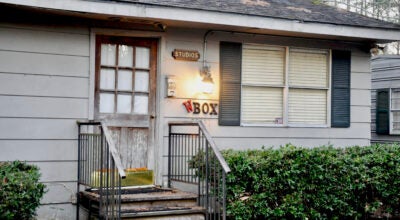Vaccine eligibility expands to 65-69 years old starting Monday
Published 4:13 pm Thursday, February 4, 2021

- Louisiana Gov. John Bel Edwards
|
Getting your Trinity Audio player ready...
|
Louisiana will begin vaccinating people between the ages of 65 and 69 against COVID-19 on Monday, expanding eligibility to more than 275,000 additional Louisianans, Gov. John Bel Edwards announced Thursday afternoon.
Some Unified Command Group members, state COVID emergency response personnel, local emergency response personnel, law enforcement, first responders and elections workers for the upcoming March and April elections will also be eligible.
An increase in doses available from the federal government to the state, the progress in administering vaccines to earlier groups and concerns about emerging COVID variants prompted Edwards to lower the age for who can be vaccinated. Louisiana has recently joined a federal pharmacy partnership that could bring as many as 14,000 additional weekly doses to the state, in addition to a weekly increase of doses by more than 20 percent from the federal government. Finally, the state has been allowed to take unused, stockpiled doses from its allocation to the federal long term care partnership to be administered in Louisiana pharmacies and clinics.
“An increase in supply of doses and our strong progress in vaccinating Louisianans allows us to expand vaccine eligibility to people 65 and older, meaning many of the most vulnerable who are most at risk for suffering serious COVID complications or death will be able to schedule their appointments beginning on Monday,” Edwards said. “Data shows that people between the ages of 65 and 74 are five times more likely to be hospitalized with COVID and 90 times more likely to die than younger people. Especially as new variants of the coronavirus spread throughout the country and state, it’s absolutely critical that we vaccinate as many people as we can and that everyone in Louisiana gets their shot when it is their turn and continues to wear masks, stay home when they can, keep social distance and avoid gatherings with people outside of their immediate household.
“To be clear, I expect that demand from everyone who is eligible will still outpace Louisiana’s supply of the vaccine, so it may still take time for people 65 through 69 to get vaccine appointments. We are working to expand access to the COVID vaccine as quickly as we can to as many people as possible as we race to slow the spread of this illness, fight off any new variants and protect the ability of our hospitals to deliver care. “As the variants have become more aggressive and the potential for a fourth surge in cases grows, vaccinating some emergency responders to ensure the government can manage the crisis is critical.”
Louisiana’s vaccine strategy was informed by the recommendations of the Advisory Committee on Immunization Practices at the Centers for Disease Control and Prevention, which recommended prioritizing health care workers, nursing home residents, people 75 and older and some essential frontline workers. Recently, both the administrations of former President Donald Trump and that of President Joseph Biden and other federal officials have encouraged states to make vaccinations for people 65 and older a top priority. Already, at least 29 other states offer vaccines to people 65 and older.
Louisiana is currently vaccinating people in Priority Group 1B-Tier 1 and, on Monday, will add people ages 65 to 69, some Unified Command Group members, state COVID emergency response personnel, local emergency response, law enforcement and some elections staff for the March and April elections. This will expand eligibility to at least 275,000 additional Louisianans.
The Louisiana Department of Health will work with the Governor’s Office of Homeland Security and Emergency Preparedness on eligibility for essential state COVID responders and local emergency personnel. Eligibility will be limited to key responders working to ensure the state is able to respond during the COVID pandemic.
LDH also will have vaccines available for a limited number of elections staff ahead of the March and April elections and is working with the Secretary of State to help operationalize their plans once they have selected and contacted poll workers.
As of Thursday, more than 534,985 doses have been administered in Louisiana, with at least 130,978 people having received both doses of the vaccine.
LDH has published the list of participating providers on its website: covidvaccine.la.gov. In addition, residents can call 211 to find a vaccine provider near them.
Eligible residents must contact a participating provider to make an appointment. Patients who arrive without an appointment will not be vaccinated. LDH cannot make appointments for patients; only providers can.
Patients should receive their second dose of the COVID vaccine at the same location where they received their first dose. Second-dose appointments should be made during the administration of the first dose.
Priority groups in Louisiana
Within priority groups and tiers there is no particular sequencing. Participating providers must make available vaccine available to anyone who is eligible. Failure to do so will inform future decisions about distribution.
Priority Group 1-A: Ongoing (around 249,000 eligible people)
- Health care workers at Tier 1 and Tier 2 hospitals.
- Staff and residents of nursing homes and long-term care facilities.
- First responders to serve as vaccinators (Emergency Medical Services, fire personnel, law enforcement).
Priority Group 1-B, Tier 1: As of Monday, Feb. 8 (around 915,000 eligible people)
- Dialysis providers and patients.
- Ambulatory and outpatient providers and staff.
- Behavioral health providers and staff.
- Urgent care clinic providers and staff.
- Community care providers and staff.
- Dental providers and staff.
- Professional home care providers (including hospice workers) and home care recipients (including older and younger people with disabilities over the age of 16 who receive community or home-based care, as well as clients of home health agencies).
- American Sign Language (ASL) interpreters and Support Service Providers (SSPs) working in community and clinic-based settings, and clients who are both deaf and blind.
- Health-related support personnel (lab staff, mortuary staff who have contact with corpses, pharmacy staff).
- Schools of allied health students, residents and staff.
- Law enforcement and other first responders.
- Persons 65 years old and older.
- Louisiana Unified Command Group.
- State and local essential COVID emergency response personnel.
- Some elections staff ahead of March and April elections.





